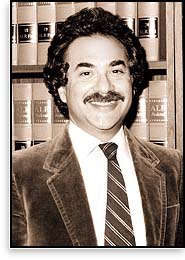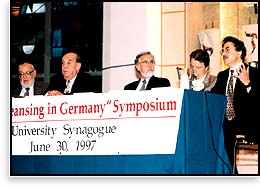



n 1981, Judge Irving R. Kaufman, writing for the U.S. Court of Appeals for the 2nd Circuit in New York, wrote that “Tolerance of the unorthodox and unpopular is the bellwether of a society’s spiritual strength.”
The context in which Judge Kaufman wrote was a decision striking down a regulation which restricted religious solicitation on the New York State Fairgrounds. And his words seem to express succinctly the view which has driven Los Angeles attorney Barry Fisher—who won the 1981 ruling and scores of others like it, both before and after—to be one of the nation’s foremost legal advocates for tolerance and religious rights.
“You might say that I am a product of the ’60s,” says Fisher, “for I grew up in the civil rights movement, worked in environmental law in the early 1970s and so on. But the religious issues which I eventually became involved in were really a very natural extension of interest and work in the field of civil rights.
“Very few saw the connection at first, but a lot of people in the legal profession came around after a while.”
Fisher, a 1968 UCLA graduate, today is a member of the same small Century City law firm he helped found 20 years ago. But his other past and present titles, awards and capacities in which he has served say much more about his life’s work: He is the Senior Vice President of Human Rights Advocates International, an international public interest law firm; Vice Chairman of the First Amendment Committee of the American Bar Association and Chairman of its Religious Freedom Subcommittee; Consultant to the American Bar Association’s Central and East European Law Institution; Fellow of the International Academy for Freedom of Religion and Belief; Delegate to the 1993 UNESCO—United Nations Conference on the Implementation of the Vienna Declaration of Human Rights; Speaker and Working Subcommittee member of the 9th Circuit United States Court of Appeals’ Conference on Race Ethnicity and Religion; and many others, past and present.
He has assisted in drafting constitutions and legislation for numerous foreign nations and authored or co-authored numerous studies, articles and papers in publications including Law and the American Indian and Devotion, Damages and Deprogramming: Strategies and Counter-Strategies in the Cult Wars. Fisher and his partners have been counsel on nearly 300 reported state and federal cases, including a dozen before the U.S. Supreme Court.
Fisher, now 53, has focused his practice and his life on the establishment and free exercise clauses of the First Amendment. The National Council of Churches has called him one of the “top two dozen” First Amendment experts in the nation. Fisher notes that while larger, more orthodox beliefs in the United States can generally take their right to exist for granted, smaller religions must be constantly vigilant.

| ||
 |
In America and abroad, the work of Barry Fisher (above, far right, at a symposium on German intolerance) has had a common thread: championing religious freedom and tolerance. |  |
Important Cases
His clients have included gypsies, American Indians, prison inmates, Jehovah’s Witnesses, Hare Krishnas and members of the Unification Church. As he has said himself, “I am drawn to minority groups which have been unjustly attacked.” But, in talking to his colleagues, it becomes clear that those who have sought—and obtained—his help are many and varied for the simple reason that Fisher does not see First Amendment protections as something to which only “chosen” groups and individuals are entitled. “Barry remembers that many of those who founded America had been effectively driven out of their homelands for their religious beliefs,” said Rev. Dean Kelley of the National Council of Churches. “He sees the First Amendment in a broad way, and he knows an infringement of First Amendment rights when he sees it.”
Some of the most important cases involving religious issues bear Fisher’s stamp.
In 1987, he won a ruling from the U.S. Supreme Court striking down a ban on soliciting at Los Angeles International Airport, concluding that the regulation went too far in limiting the right to free speech. Justice Sandra Day O’Connor, writing for the court, said that “No conceivable governmental interest would justify such an absolute prohibition of speech.”
Fisher noted that this decision vindicated a series of lower court holdings that soliciting may be regulated but not prohibited. “The bottom line is that you can’t have a categorical prohibition like this one, and that is what the Court held,” he said.
He was also instrumental in obtaining the passage of a highly important piece of First Amendment legislation: California Civil Code section 425.14, originally passed into law in 1988 as California Senate Bill 1. The legislation which Fisher championed protects religious organizations from frivolous and vindictive punitive damages claims. “This law has changed the climate for religions in California,” said constitutional lawyer Tim Bowles, who also worked on the bill. “Barry deserves many thanks for his work to make it a reality.”
Fisher also worked extensively in environmental law and, for nearly three years, served as a founding staff attorney to the Sierra Club Legal Defense Fund in San Francisco. “Working to protect the environment is something that drove me then, and still does today,” he says. “The lands outside America’s city limits and the living things that dwell there offer a refuge for all of us, whether or not we avail ourselves of them. They represent the stuff of freedom—a place we can go, or at least know we could go.”
Beyond America
But some of his most meaningful contributions may be those which reach beyond the borders of the United States altogether. He has been involved in drafting constitutions and other legislation for countries such as Moldova, Albania and Belarus.
When Romanians looked to the West for advice on how best to govern themselves following the 1989 revolution that overthrew long-time dictator Nicolae Ceausescu, they called on Barry Fisher. Fisher, who has served as general counsel to the United States Romani Council, travelled to Romania to advise scholars, politicians, judges and others on the drafting of their constitution. He was later consulted by the American Bar Association’s Central and East European Law Initiative (CEELI) to review the draft constitution produced by the Romanian parliamentary commission.
CEELI member Bob O’Neil described the group of prominent legal scholars who joined Fisher in reviewing and commenting upon the draft constitution as a “cooperative effort to support and facilitate law reform” in Romania, Czechoslovakia, Hungary, Yugoslavia, Bulgaria and Poland. The group also focused on criminal law reform and judicial independence.
The core of his advice to the Romanians was not surprising. “[I told them] the strength of any new constitution is how willing you are to give political rights and judicial review to ethnic, religious and racial minorities,” he said.
Wherever his work has taken him, Fisher’s toils have had a common thread: championing religious freedom and tolerance. As one attorney put it, “History will bear him out as one who enhanced the spiritual strength of both America and the 

